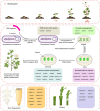Plant genetic transformation: achievements, current status and future prospects
- PMID: 40052992
- PMCID: PMC12120897
- DOI: 10.1111/pbi.70028
Plant genetic transformation: achievements, current status and future prospects
Abstract
Regeneration represents a fundamental biological process wherein an organism's tissues or organs repair and replace themselves following damage or environmental stress. In plant systems, injured tree branches can regenerate adventitious buds and develop new crowns through propagation techniques like cuttings and canopy pruning, while transgenic plants emerge via tissue culture in genetic engineering processes intimately connected to plant regeneration mechanisms. The advancement of plant regeneration technology is critical for addressing complex and dynamic climate challenges, ultimately ensuring global agricultural sustainability. This review comprehensively synthesizes the latest genetic transformation technologies, including transformation systems across woody, herbaceous and algal species, organellar genetic modifications, crucial regeneration factors facilitating Agrobacterium-mediated transformations, the intricate hormonal networks regulating plant regeneration, comparative analyses of transient transformation approaches and marker gene dynamics throughout transformation processes. Ultimately, the review offers novel perspectives on current transformation bottlenecks and proposes future research trajectories.
Keywords: hormone regulation; plant genetic transformation; plant regeneration; regeneration factor; single‐cell and spatial transcriptome.
© 2025 The Author(s). Plant Biotechnology Journal published by Society for Experimental Biology and The Association of Applied Biologists and John Wiley & Sons Ltd.
Conflict of interest statement
The authors declare no competing interests.
Figures



Similar articles
-
Unlocking regeneration potential: harnessing morphogenic regulators and small peptides for enhanced plant engineering.Plant J. 2025 Jan;121(2):e17193. doi: 10.1111/tpj.17193. Epub 2024 Dec 10. Plant J. 2025. PMID: 39658544 Free PMC article. Review.
-
Efficient Plant Regeneration and Transient Genetic Transformation System of Prunus xueluoensis via an Agrobacterium-Mediated Method.Int J Mol Sci. 2025 Apr 10;26(8):3588. doi: 10.3390/ijms26083588. Int J Mol Sci. 2025. PMID: 40332136 Free PMC article.
-
Agrobacterium-mediated plant transformation: the biology behind the "gene-jockeying" tool.Microbiol Mol Biol Rev. 2003 Mar;67(1):16-37, table of contents. doi: 10.1128/MMBR.67.1.16-37.2003. Microbiol Mol Biol Rev. 2003. PMID: 12626681 Free PMC article. Review.
-
Engineering Agrobacterium for improved plant transformation.Plant J. 2025 Mar;121(5):e70015. doi: 10.1111/tpj.70015. Plant J. 2025. PMID: 40051182 Free PMC article. Review.
-
The use of phenotypic markers to identify Brassica oleracea genotypes for routine high-throughput Agrobacterium-mediated transformation.Plant Cell Rep. 2004 Aug;23(1-2):64-70. doi: 10.1007/s00299-004-0818-7. Epub 2004 Jun 9. Plant Cell Rep. 2004. PMID: 15197481
Cited by
-
Escaping endogenous miRNA post-transcriptional silencing of JrGRF4b enhanced transformation efficiency in woody plants.Front Plant Sci. 2025 Jun 18;16:1629166. doi: 10.3389/fpls.2025.1629166. eCollection 2025. Front Plant Sci. 2025. PMID: 40606477 Free PMC article.
References
-
- Abiri, R. , Atabaki, N. , Abdul‐Hamid, H. , Sanusi, R. , Ab Shukor, N.A. , Shaharuddin, N.A. , Ahmad, S.A. et al. (2020) The prospect of physiological events associated with the micropropagation of Eucalyptus sp. Forests, 11, 1211.
-
- Ahmad, N.M. and Martin, P. (2017) Pollen morphology and physiology of Poa labillardieri (Poaceae). Int. J. Plant Reprod. Biol. 2, 139–147.
-
- Ahmad, N. , Michoux, F. , Lössl, A.G. and Nixon, P.J. (2016) Challenges and perspectives in commercializing plastid transformation technology. J. Exp. Bot. 67, 5945–5960. - PubMed
-
- Alwen, A. , Eller, N. , Kastler, M. , Moreno, R.M.B. and Heberle‐Bors, E. (1990) Potential of in vitro pollen maturation for gene transfer. J. Plant Physiol. 79, 194–196.
Publication types
MeSH terms
Grants and funding
LinkOut - more resources
Full Text Sources

